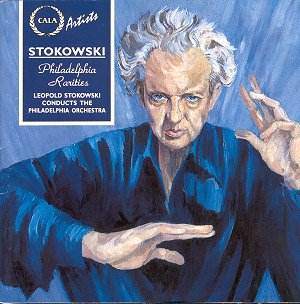I recently listened to two of Stokowski’s final recordings,
of symphonies by Brahms and Mendelssohn (Cala CACD 0531), taped in 1977
shortly after his 95th birthday. Far from the grand seignorial
nonagenarian, utterly unlike a sunset valediction these architecturally
and sonically impressive traversals commanded nothing but the most august
praise and oddly put me in mind of this 1934 Scheherazade, one of the
imperishable classics of the gramophone. He had recorded truncated excerpts
acoustically in Philadelphia and in 1927 had gone on to record the complete
symphonic suite, a much-admired set, currently available on Biddulph
WHL010. The 1934 remake does, as Edward Johnson’s typically astute booklet
notes observe, take significantly longer. His comment regarding the
conductor’s use of portamento as a narrative device is well made and
instructive, though I should add that colouristically and expressively
it is an effect I feel misguidedly pervasive. It is certainly nowhere
nearly as prevalent in his other recordings of the piece (the memorable
London sessions of 1951 with the Philharmonia and 1964 with the LSO
amongst them, nor in the live performances which have surfaced). Otherwise
this is a consistently involving and gorgeously opulent recording, vibrantly
played, not least by the Philadelphia’s leader of two decades, Alexander
Hilsberg, who is memorable in his solo role. Russian-born Hilsberg was
later to wield the baton himself, having had plenty of experience under
Stokowski, and in 1952 joined the New Orleans Symphony Orchestra as
conductor. He was a leader in the Burgin and Piastro class, though maybe
not as scintillating as the latter.
Elsewhere there is a considerable bonus in the suite
from The Nutcracker. First recorded in 1926 this is another remake from
1934. Some of Stokowski’s rhythmic licence can be felt here and there;
tempos are surprisingly solemn or fleet but the recording is still excellently
alive and vivid in execution. The two makeweights by Ippolitov-Ivanov
and Glazunov benefit from the Stokowskian treatment, the former explicitly
because it’s an orchestration by the conductor; both are oriental morceaux
well worth the hearing.
In his final years he returned to Scheherazade with
the RPO, made in 1975 before those final symphonies of 1977, but it’s
always been this recording I turn to, despite considerable temptation;
something in it is something of the essence of Stokowski himself.
Jonathan Woolf


